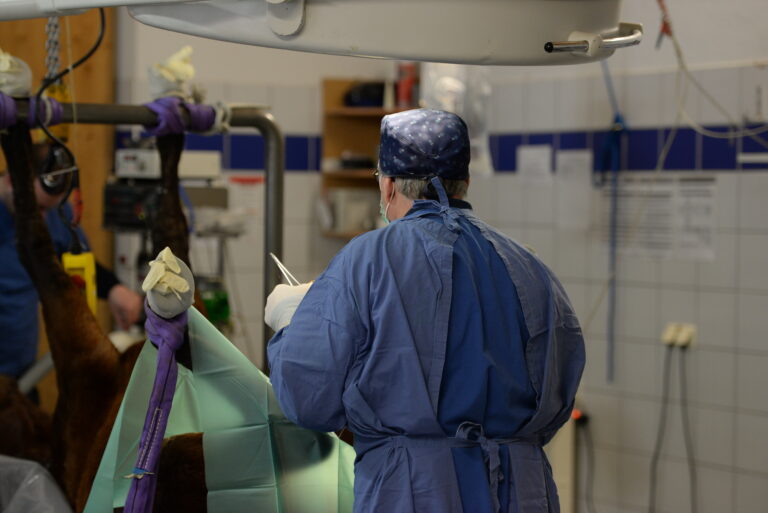
Editor’s Note: Learn more about vesicular stomatitis virus (VSV) on EquiManagement’s podcast Disease Du Jour featuring Dr. Angela Pelzel-McCluskey.
On July 29, 2019, the National Veterinary Services Laboratories in Ames, Iowa, confirmed a finding of vesicular stomatitis virus (VSV) infection (Indiana serotype) on an equine premises in Tillman County, Oklahoma. One horse on the premises has met the case definition of infection with compatible clinical signs and complement fixation test positive results at 1:40 or greater. The clinical horse is also PCR positive for VSV-Indiana on a swab of the lesions. This is the 2019 index case of VSV for Oklahoma.
This makes Oklahoma the fifth state in 2019 to have positive vesicular stomatitis cases following Texas, New Mexico, Colorado and Wyoming.
Editor’s note: EquiManagement will publish an episode of our podcast Disease Du Jour on August 1 about vesicular stomatitis virus. Our guest will be Dr. Angela Pelzel-McCluskey, who is a National Equine Epidemiologist for the United States Department of Agriculture (USDA), Animal and Plant Health Inspection Service (APHIS), Veterinary Services. Listen to or download episodes of Disease Du Jour on iTunes, SoundCloud or Stitcher. You will also find an article on EquiManagement.com on August 1 giving you more information about Dr. Pelzel-McCluskey and containing links to the podcast.
Since the last VSV Situation Report on July 24, 2019, the following information has been reported by USDA APHIS Vet Services.
Colorado (31 new confirmed positive, 72 new suspect premises)
- Adams County – 1 new confirmed positive, 1 new suspect premises
- Archuleta County – 2 new confirmed positive premises
- Boulder County – 8 new confirmed positive (1 bovine), 11 new suspect premises
- Jefferson County (New Infected County) – 1 confirmed positive premises
- La Plata County – 27 new suspect premises
- Larimer County – 12 new confirmed positive, 18 new suspect premises
- Mesa County (New Infected County) – 5 confirmed positive, 2 suspect premises
- Montezuma County – 1 new confirmed positive, 5 new suspect premises
- Weld County – 1 new confirmed positive, 8 new suspect premises
- The following previously VSV-infected or suspect premises have been released from quarantine: 3 in La Plata County, 7 in Larimer County and 4 in Weld County
New Mexico (9 new confirmed positive, 6 new suspect premises)
- Cibola County (New Infected County) – 1 confirmed positive premises
- Rio Arriba County – 1 new suspect premises
- San Miguel County (New Infected County) -1 confirmed positive premises
- Santa Fe County – 3 new suspect premises
- Sierra County (New Infected County) – 1 confirmed positive premises
- Valencia County – 6 new confirmed positive, 2 new suspect premises
Texas (8 new confirmed positive, 30 new suspect premises)
- Brown County (New Infected County) – 1 confirmed positive premises
- Bastrop County – 18 new suspect premises
- Hays County – 2 new suspect premises
- Hood County – 3 new suspect premises
- Palo Pinto County (New Infected County) – 2 confirmed positive premises
- Parker County (New Infected County) – 1 confirmed positive premises
- Shackelford County – 1 new confirmed positive premises
- Somervell County – 1 new confirmed positive premises
- Travis County (New Infected County) – 2 confirmed positive, 7 suspect premises
- One previously VSV-infected premises in Johnson County has been released from quarantine
Wyoming (1 new confirmed positive premises)
• Platte County – 1 new confirmed positive premises
Summary of the 2019 Outbreak
The 2019 VSV outbreak began on June 21, 2019, when the National Veterinary Services Laboratories (NVSL) in Ames, Iowa, confirmed the first VSV-positive premises in Kinney County, Texas.
New Mexico, Colorado, Wyoming and Oklahoma subsequently broke with cases, which were confirmed by NVSL on June 26, 2019 (Sandoval County, New Mexico), July 3, 2019 (Weld County, Colorado), July 24, 2019 (Platte County, Wyoming), and July 29, 2019 (Tillman County, Oklahoma).
Since the start of the outbreak, 366 VSV-affected premises have been identified (174 confirmed positive, 192 suspect). Three hundred sixty-five (365) of these premises have only equine species clinically affected and 1 premises has affected cattle (Boulder County, Colorado).
Colorado has identified 236 affected premises (102 confirmed positive, 134 suspect) in 12 counties (Adams, Archuleta, Boulder, Broomfield, Delta, Jefferson, La Plata, Larimer, Mesa, Montezuma, Morgan, and Weld Counties).
New Mexico has identified 52 affected premises (37 confirmed positive, 15 suspect) in 9 counties (Cibola, Los Alamos, Rio Arriba, Sandoval, San Miguel, Santa Fe, Sierra, Taos, and Valencia Counties).
Oklahoma has identified 1 affected premises in 1 county (Tillman County). Texas has identified 75 affected premises (32 confirmed positive, 43 suspect) located in 17 counties (Bastrop, Brown, Coleman, Hays, Hood, Johnson, Kerr, Kinney, Palo Pinto, Parker, Shackelford, Somervell, Taylor, Tom Green, Travis, Val Verde, and Wichita Counties).
Wyoming has identified 2 affected premises in 1 county (Platte County).
All States Overall there have been a total of 29 previously VSV-infected or suspect premises that have completed the quarantine period and been released.
Information for this report came from the 2019 Vesicular Stomatitis Situation Report dated July 29. This report is published by USDA APHIS Veterinary Services. You can download that report here.








